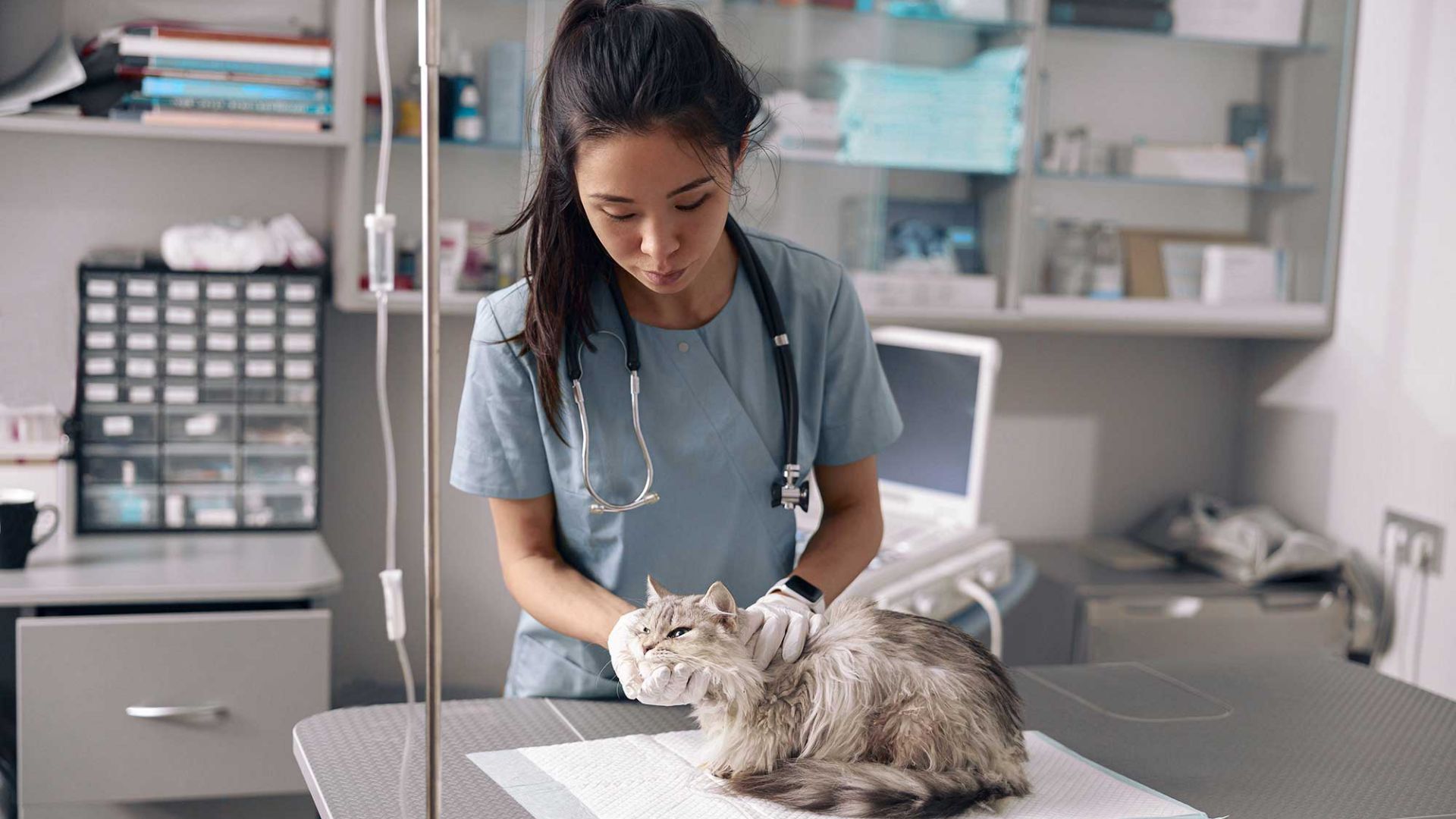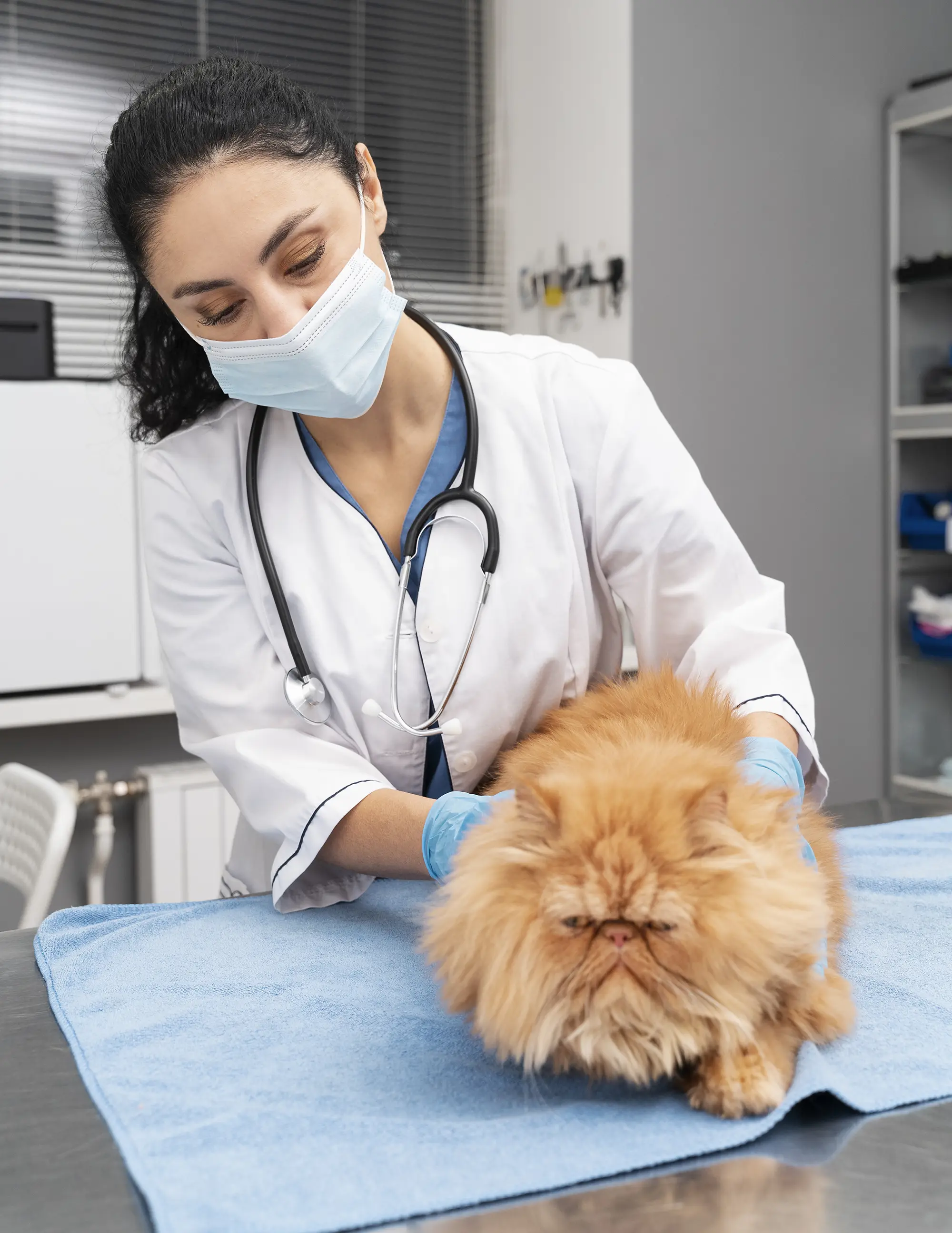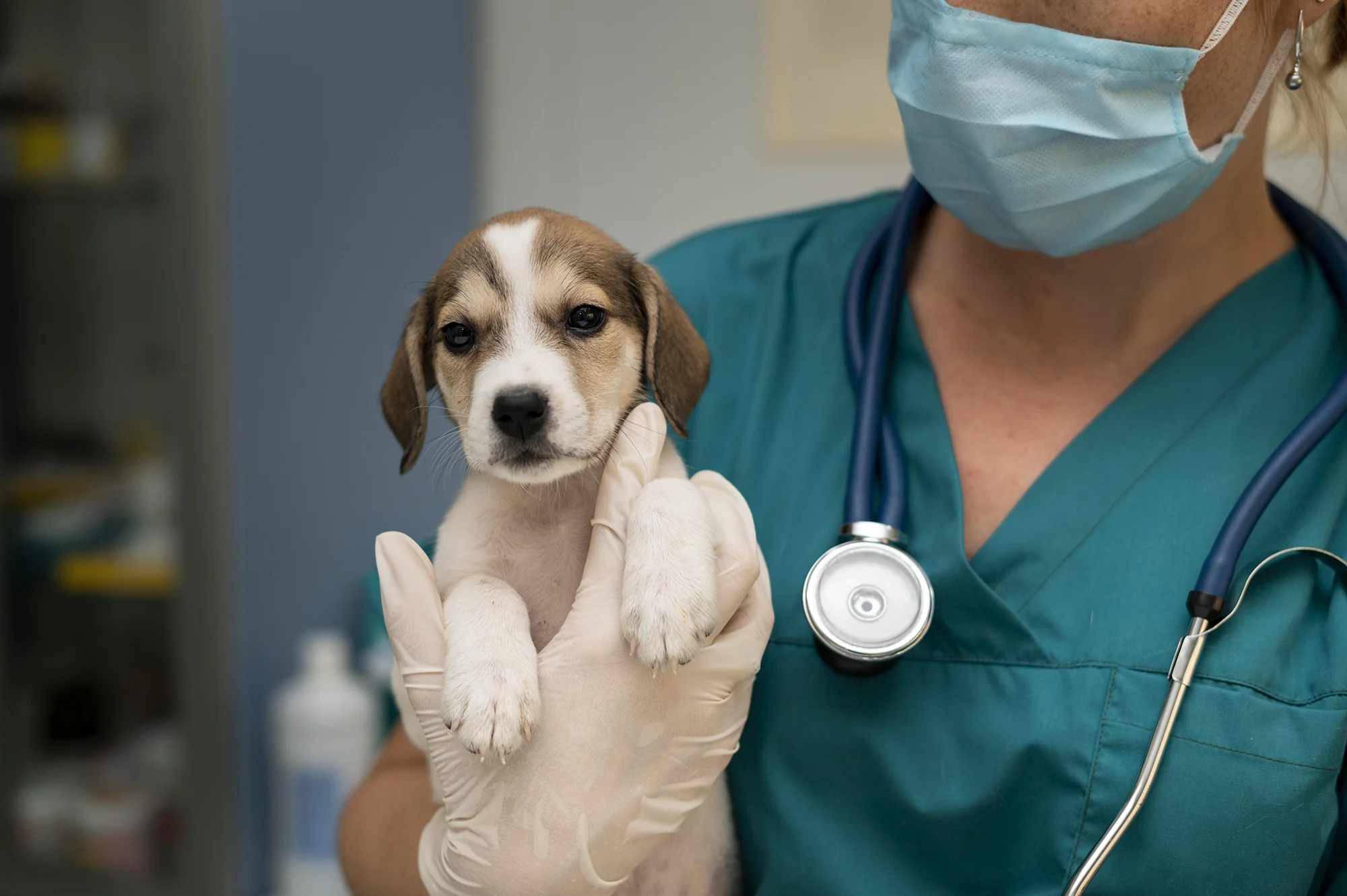What GCSEs do you need to be a vet? Key Choices for Aspiring Vets

May 23, 2025 | 9 months | By Career
In This Article:
Embarking on a journey to become a veterinarian is a rewarding pursuit for those passionate about animal health and welfare. To lay the groundwork for veterinary medicine studies in the UK, you’ll need a solid academic foundation, starting with at least five GCSEs at grade A or above. These subjects are carefully chosen to equip you with the scientific knowledge, analytical skills, and communication abilities required to succeed in rigorous veterinary programs. Universities prioritize the following core GCSEs to ensure you’re well-prepared for the challenges of this career:
- Biology
- Chemistry
- Maths
- English
- One additional subject (e.g., Physics, Psychology, or Geography)
Becoming a vet is more than just a rewarding career—it's a lifelong passion. Not only do you get to pet and hug beautiful animals during your working hours, but you also help creatures of all shapes and sizes to live long, happy lives. But how do you get started on this career? What GCSEs are required to pursue veterinary studies in the UK, and how can you best prepare for them? In this comprehensive article, we'll break down everything aspiring vets need to know, from the essential subjects to the best tips from experts on turning your dedication to animal welfare into a profession.
What GCSEs do I need to be a vet?
The acronym GCSE stands for General Certificate of Secondary Education, an essential qualification typically obtained by fifteen and sixteen-year-olds in the UK. GCSEs aren't just milestones—they play a vital role in shaping a student's academic journey, as they provide a solid foundation for higher education and future career paths. For those aiming for a degree in Veterinary Science, achieving high grades in these subjects is a must.
Core Subjects: The must-haves of any list
While each university may have slightly different entry requirements, there are specific core qualifications that every aspiring vet should have. To pursue a career in veterinary medicine, you should have the following GCSEs:
Biology
- Why is it important?
Biology gives students a comprehensive understanding of living organisms, including their anatomy, physiology, and genetics. A strong grasp of biological principles is essential for understanding animal health, disease processes, and how to treat them.
- Recommended levels and grades
Most universities expect students to achieve top grades (A or higher) in both GCSE Biology and A-level Biology. This subject is a core requirement and a preferred qualification for almost all veterinary programs, so make sure to check out this article to learn how to ace the Biology GCSE test.
Chemistry
- Why is it important?
Chemistry delves into organic and inorganic chemistry, biochemistry, and pharmaceuticals to provide essential knowledge about chemical processes within the animal body and the science behind medications. Thus, this subject is key to understanding the composition of medicines, drug interactions, diagnostics, and treatment modalities.
- Recommended levels and grades
Achieving A grades or higher in both GCSE Chemistry and A-level Chemistry is typically required by most universities. Chemistry pairs seamlessly with Biology and strengthens your academic profile for veterinary medicine.
Fast-track Your Qualification
Get prepped for your exams quicker than you would at school!
Find out more
Maths
- Why is it important?
Maths represents the backbone of essential skills like data analysis, statistical interpretation, and problem-solving—skills that are crucial for conducting research, determining drug dosages, and interpreting diagnostic test results. Plus, this subject helps aspiring vets develop logical thinking, which is key for making accurate and informed clinical decisions.
- Recommended levels and grades
Having at least an A grade in GCSE Maths is essential, and pursuing A-level Maths is highly recommended. This subject may seem challenging at first, but we have elaborated a guide that this guide will help you to get an A* in (I)GCSE Maths.
English
- Why is it important?
English hones critical analysis and reading comprehension, as well as verbal and written communication skills, all of which are must-have qualities for writing reports, explaining diseases and diagnoses, as well as communicating clearly and effectively with clients and colleagues.
- Recommended levels and grades
A minimum of an A grade in GCSE English is typically expected because the communication skills you develop when studying this subject will be invaluable throughout your veterinary career. Here are some tips on how to study for (I)GCSE English and achieve the best results.
Complementary subjects according to specialisation
Just like in many other professions, aspiring vets can choose to specialise in different areas of veterinary medicine. Depending on their interests, they may consider studying additional subjects during their GCSEs that align with the specific requirements of their chosen field of specialisation.
Physics
Although not always a strict requirement, GCSE Physicshelps round out your scientific knowledge and learn about biomechanics, imaging technologies, and radiation therapy. These skills are particularly valuable for students aiming to work in hands-on roles, such as veterinary surgeons, pathologists, and oncologists, where understanding these processes is vital to providing accurate diagnoses and effective treatments.
Psychology
While it may not seem directly related to veterinary studies, GCSE Psychologyprovides precious insight into the social and cultural contexts in which animals and humans interact. Understanding human-animal relationships is crucial for veterinary nurses, behaviourists, and emergency care vets. After all, the well-being of companion animals is closely tied to the beliefs, behaviours, and emotional states of their human caregivers.
Computer science
In today's tech-driven world, computer skills are essential across many fields, including veterinary medicine. For those interested in becoming veterinary technicians, Computer Science provides a foundation for understanding the technology used in various veterinary procedures, from diagnostic screenings to radiographs and dental procedures. Additionally, strong computer skills can enhance clinic management, streamline patient monitoring, and improve overall care. It is also particularly beneficial for vets who are planning to enter the research field, where several devices could be used to analyse fluids, microorganisms and medicines.
Geography & Environmental Science
Since it explores the physical features of the Earth and how human activity shapes them, GCSE Geographyprovides essential knowledge about animal populations, their geographical distribution, and how climate change affects their health and behaviour. This subject is a must for students aiming to specialise in wildlife, zoo, exotic, marine, or farm animal veterinary care, as it equips them with everything they need to know to protect animal welfare in diverse environments.
What GCSE grades do you need to be a vet?
Your chances of gaining admission to veterinary school not only depend on the GCSE subjects you choose but also on the grades you achieve. Each institution has its own specific expectations, though. Below, you'll find the requirements for applying to some of the top veterinary schools in the UK.
Royal Veterinary College (RVC)
At the Royal Veterinary College, prospective students must have a minimum of five GCSEs at grade 7 (A), including Combined Science, Biology and Chemistry, or Science and Additional Science. Additionally, GCSEs in English Language, Mathematics, and Physics should have at least 6 (B) grades.
University of Cambridge
While Cambridge University places more weight on A-level than GCSEs, it's a good idea for applicants to achieve A*(8-9) grades in science and maths-related subjects. For A-levels, this institution typically expects A*AA grades in Chemistry and at least one or two other science or maths subjects.
Easy Flexible Payments with CloudLearn
Spread the cost of your course with flexible, affordable payment plans.
Find out more
University of Liverpool
To apply for the University of Liverpool, aspiring vets should have at least five GCSEs at grade 7 (A), including two science GCSEs, either taken separately or as Dual Science. Applicants must also achieve a minimum grade of 6 (B) in English (literature or language) and Maths.
University of Bristol
The University of Bristol has slightly more lenient GCSE requirements: applicants must have a minimum grade of 4 (C) in Maths and a grade of 6 (B) in English. However, more emphasis is placed on A-level performance, with applicants expected to achieve A grades in at least three subjects, including Chemistry and either Biology, Physics, or Maths.

How to become a vet in Uk? Further tips & advice for your veterinary journey
Liking animals is just the first step toward a career dedicated to their care. To succeed in veterinary medicine, you'll need much more than passion. Aspiring vets must be emotionally resilient, have a strong stomach, and possess sharp problem-solving skills. Most importantly, they must complete a five-year veterinary degree at one of the eleven accredited veterinary schools in the UK.
Consider university entry requirements
Each university has its own entry criteria, so you should research thoroughly before applying. Review the specific GCSE and A-Level subjects and grades required by each veterinary school, as well as any work experience expectations. Additionally, take note of any entrance exams or interviews required as part of the admission process to make sure you're fully prepared.
Extra ways to reinforce your path
Given the highly competitive nature of veterinary science courses in the UK, it's important to strengthen your application beyond just excellent grades. While strong GCSE results are crucial, you can boost your chances of being accepted into a university of your choice by gaining relevant work experience, engaging in extracurricular activities, and excelling in your A-Levels.
Work experience
Work experience is highly valued in university applications. Aspiring vets are encouraged to seek hands-on experience by shadowing veterinarians, volunteering at animal shelters, or undertaking placements in veterinary practices, thus demonstrating their commitment to the field and gaining valuable insights into the profession.
Extracurriculars
While extracurriculars may not carry the same weight as academic achievements, they can still help set you apart from other prospective students. Engaging in activities that showcase your passion for animal welfare, such as starting an awareness campaign or participating in animal-related community projects, can give your application an extra edge.
A-levels
While GCSEs are important when applying to university, most veterinary schools place greater emphasis on higher qualifications. Aspiring vets are typically required to have science-based A-levels, particularly in Biology and Chemistry, which lay the foundations for understanding the core principles of veterinary medicine and help position you as a strong candidate for admission.
Where to study GCSEs? Options for all ages
Whether you're a young student or an adult returning to education, there are many options available for studying GCSEs. The path you choose will depend on your learning style, schedule, and personal preferences. Below, we explore four options that suit different types of learners' specific needs.
Traditional schools
Traditional schools are the most common way for younger students to take their GCSEs. With a structured curriculum and face-to-face lessons, these institutions provide a well-rounded educational experience and plenty of resources to prepare for exams, alongside extracurricular activities to support personal growth.
Night schools
For those balancing work with academic responsibilities, night schools offer an alternative route to gaining GCSE qualifications. Unlike traditional schools, these institutions have flexible learning schedules that allow their students to study part-time in a structured environment that doesn't disrupt their daytime activities.
Private education centres
Private education centres are perfect for students who prefer smaller class sizes or require personalised attention. These centres often provide accelerated learning options, helping students prepare for their GCSEs in a shorter period of time, and tailored support for specific subjects and learning needs.
Homeschooling
The only option that provides maximum flexibility is homeschooling. This learning method allows both young learners and adult students to take comprehensive GCSE courses with full support and resources in platforms like CloudLearn while keeping complete control over their learning pace and schedules.

Feeling overwhelmed? With CloudLearn, GCSE success is guaranteed!
Choosing your career path can feel overwhelming, but don't worry—CloudLearn is here to help. Our accredited online GCSE courses are backed by a team of dedicated, experienced tutors eager to see you succeed. With our structured learning hours, flexible study options, and expert support, you'll be fully prepared to achieve top grades and earn your GCSEs in no time. Let us guide you as you take the first steps toward becoming the vet you've always wanted to be!
Frequently Asked Questions
How many GCSEs do you need to become a veterinarian?
To become a veterinarian, you need at least five GCSEs, including core subjects like Science, Maths, and English. Enrol in our online courses today and obtain all the necessary qualifications to apply to the best universities in a trice.
Do you need a Triple Science GCSE to be a vet?
You don't need a Triple Science GCSE to become a bet. A Dual Science GCSE is sufficient. Our comprehensive Biology and Chemistry courses will help you prepare effectively.
What subjects are best for a vet?
The core GCSE subjects for aspiring vets are Biology, Chemistry, Maths, and English. We provide tailored courses to help you master these subjects and boost your chances of success.
Can you become a vet without GCSEs?
Becoming a vet without GCSEs is possible, but earning them is crucial for university admission. With our flexible online courses, you'll quickly gain the GCSE qualifications you need to start your journey toward vet school.
Can I be a vet without Maths?
No, it's virtually impossible to become a vet without passing GCSE Maths. Every veterinary school in the UK requires at least a grade 5/6 (B) in GCSE Maths. This subject is essential because veterinary medicine involves calculations for medication dosages, interpreting lab results, and understanding research statistics. If you've struggled with Maths, consider getting additional support and retaking the exam rather than abandoning your veterinary career goals.
Can I be a vet without chemistry?
Most veterinary degrees require students to have at least 5 GCSEs including English, Maths and Biology or Chemistry or Science. Keeping that in mind, you may be able to enter vet courses without Chemistry as long as you have other Science GCSEs. However, keep in mind that CHemistry is of utmost importance in this career, so even if you don’t take this GCSE subject, you will certainly need the knowledge and skills in that area.